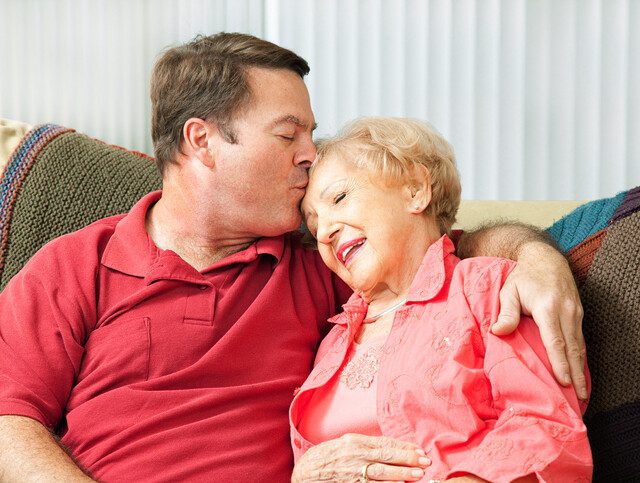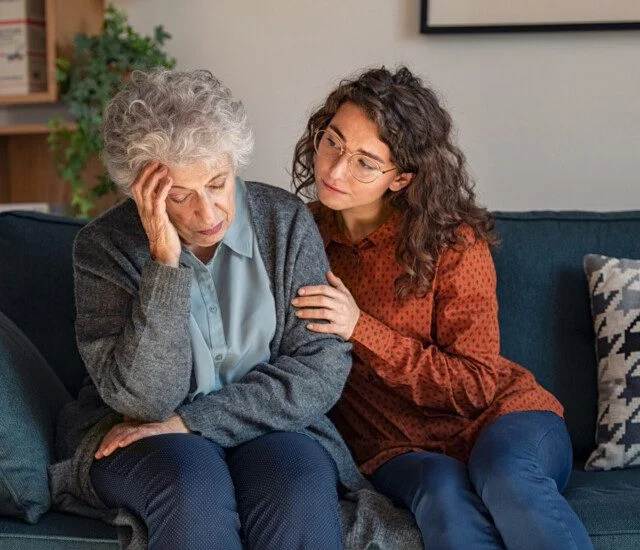When it comes to Alzheimer’s and other dementias, there isn’t a single blueprint for how it progresses and when someone needs more support. But you can understand the pieces, the building blocks, of caregiver support and residential memory care options. And when it comes time to evaluate and discuss what works best for your family, be honest about current needs, future support and caregiving limitations.
A Typical Sign of Aging or a Sign of Alzheimer’s
Unfortunately, occasional forgetfulness is just part of getting older. Our brains begin changing in our 20s, and those small changes continue throughout our lives. And as we get closer to age 70, the changes compound and can start showing signs of memory loss.
But when these memory lapses become more frequent, or the person is unable to recall items later, memory loss could be a sign of more significant cognitive decline. The Alzheimer’s Association focuses on 10 early signs of Alzheimer’s and dementia and shares some important differences between typical and atypical brain changes.
Typical age-related change: Getting confused about the day of the week, but remembering it later.
Warning sign: Losing track of seasons or having trouble understanding something if it’s not happening right now.
Typical age-related change: Occasionally losing track of items but being able to retrace steps to find them later.
Warning sign: Misplacing items, putting things in unusual places and being unable to go back over their steps to find them.
While each caregiving situation is unique, when changes to memory, thinking and reasoning impact the safety or everyday function of a loved one, it may be time to consider outside care and support services.
What Alzheimer’s & Dementia Care Options Are Available Near Bloomington?
Based on your family’s specific needs and goals, remaining at home may be a good option. You may also decide that a continuing care retirement community (CCRC) can help your loved one as their diagnosis progresses. Or maybe you find a mix of care services works best for you. By understanding the support options available, you can help make an informed decision and develop your own personal family care blueprint.
- Adult day centers offer structured, safe social engagement, programming and activities to support those suffering from memory loss. Some centers may even offer counseling, health services and other therapies, too.
- In-home care services include both medical and non-medical assistance and can run the gamut from housekeeping and companionship to skilled licensed care (for injections, physical therapy and more).
- Respite care is just that “ a rest for caregivers and a safe, structured environment for their loved ones. Respite care can include support for regular intervals or for an event like a vacation.
- Residential memory care, the most comprehensive care option, offers specially designed environments with structured programming to support those with Alzheimer’s and other dementias. By focusing on the safety, security and well-being of residents 24/7, memory care residences strive to lessen stress for community members and their loved ones.
Prepare to Have Several Care-Needs Discussions
Diseases like dementia or Alzheimer’s don’t progress according to a roadmap, and it can be difficult for caregivers when needs shift and you already feel stretched thin. According to a recent Alzheimer’s Association report, there are nearly 11 million unpaid caregivers providing an estimated 15.2 billion hours of care each year (and that time is valued at around $257 billion). With staggering statistics like these, it’s easy to understand how caregivers can get burned out.
As you begin to understand the diagnosis and disease progression of your loved one, it can be difficult to know when they can no longer live independently. When you get to the decision-making stage, be prepared for potentially difficult, frustrating and emotional conversations. Checking in with other family members, neighbors or local support groups can shed light on what may lay ahead.
Sitting down to talk with your loved one can often be the most difficult part. Remember to be reassuring, patient and supportive. And also be prepared to have multiple conversations before you’re able to develop the Alzheimer’s care plan that works best for your family.
Friendship Village of Bloomington’s Support for Memory Loss
Discover a truly supportive, engaging community at every level of care offered here at Friendship Village of Bloomington. And find peace of mind thanks to practical care planning for future health needs through Life Care.
And new this year, we’ve expanded our memory care and assisted living residences, including a special memory care courtyard with multiple gardens, to better support and engage our residents. Specially trained team members care for the medical, physical, mental and emotional needs of our memory care residents to allow family members and loved ones time to spend together without tending to their physical needs.
Our engaging neighborhood features impressive amenities and engaging research-based programming to support brain health. From the resident-led Dementia Friends interest group to innovative fitness NeuroMove™ classes, the entire community supports those impacted by memory loss, Alzheimer’s and other dementias
If you’re ready to learn more about how Friendship Village of Bloomington can support you and your loved one, please contact us. We can offer more personalized details about care options and talk through any questions you may have.


